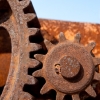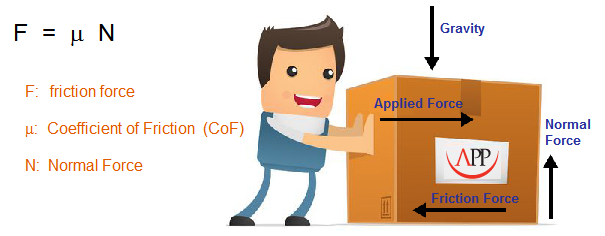RL Blogs

By Advanced Piping Products
Sep 07, 2019Prevent piping corrosion related to exterior friction wear. |
| Process pipes are subjected to movement due to changes in temperature, load, or other operating variables and this movement causes friction between the pipe and its support. Frictional forces are undesirable because of the wear and tear that they cause to a pipe.
Fortunately, there are composite pipe supports engineered to minimize friction throughout your piping system.
A frictional force is experienced whenever two materials move or slide across each other. This frictional force can be described by the equation:
Frictional force is experienced whenever two materials move or slide across each other. On pipes, friction is undesirable because it causes abrasion and leads to wear.
The Coefficient of Friction is a dimensionless number that describes the resistance of movement between two materials. The higher the CoF value, the more frictional resistance there is. For example, the CoF between your foot and a sheet of ice is much lower than that between sandpaper and a piece of wood.
Metal-to-metal contact has a higher CoF than that of metal-to-polymer and much higher than that of polymer-to-polymer.
Friction is undesirable because it causes abrasion and leads to wear. Abrasion can be thought of cutting on a microscopic scale. Abrasive wear is problematic because it decreases the mechanical integrity of piping. Pipes could experience fatigue failure sooner than designed for.
In addition to mechanical wear, abrasion makes the metal pipe more susceptible to corrosion. Often times, pipes are painted in order to prevent corrosion. The idea behind this is that the paint will act as a physical barrier and prevent a corrosion cell from forming.
Unfortunately, abrasion can cause pipe coatings to degrade, which leaves the pipe without its protective coating and corrosion ensues.
Abrasion also exacerbates corrosion because it alters the microstructure of the metal and subjects the material to stress. High stress areas are at a higher energy state than the un-worn metal so the worn area can become anodic to the low stress area, which creates a corrosion cell.
This type of corrosion would be a localized attack, which is more difficult to detect than uniform corrosion and therefore is more dangerous.
As previously mentioned, there is a large frictional force when metals slide on each other. Contrarily, polymer-to-metal and polymer-to-polymer interfaces have lower CoF values, which make polymers the optimal low friction bearings.
Composite pipe supports are engineered to reduce friction and prolong the life of your piping system. Are there applications in your refinery that can benefit from these types of supports? |
|
|









